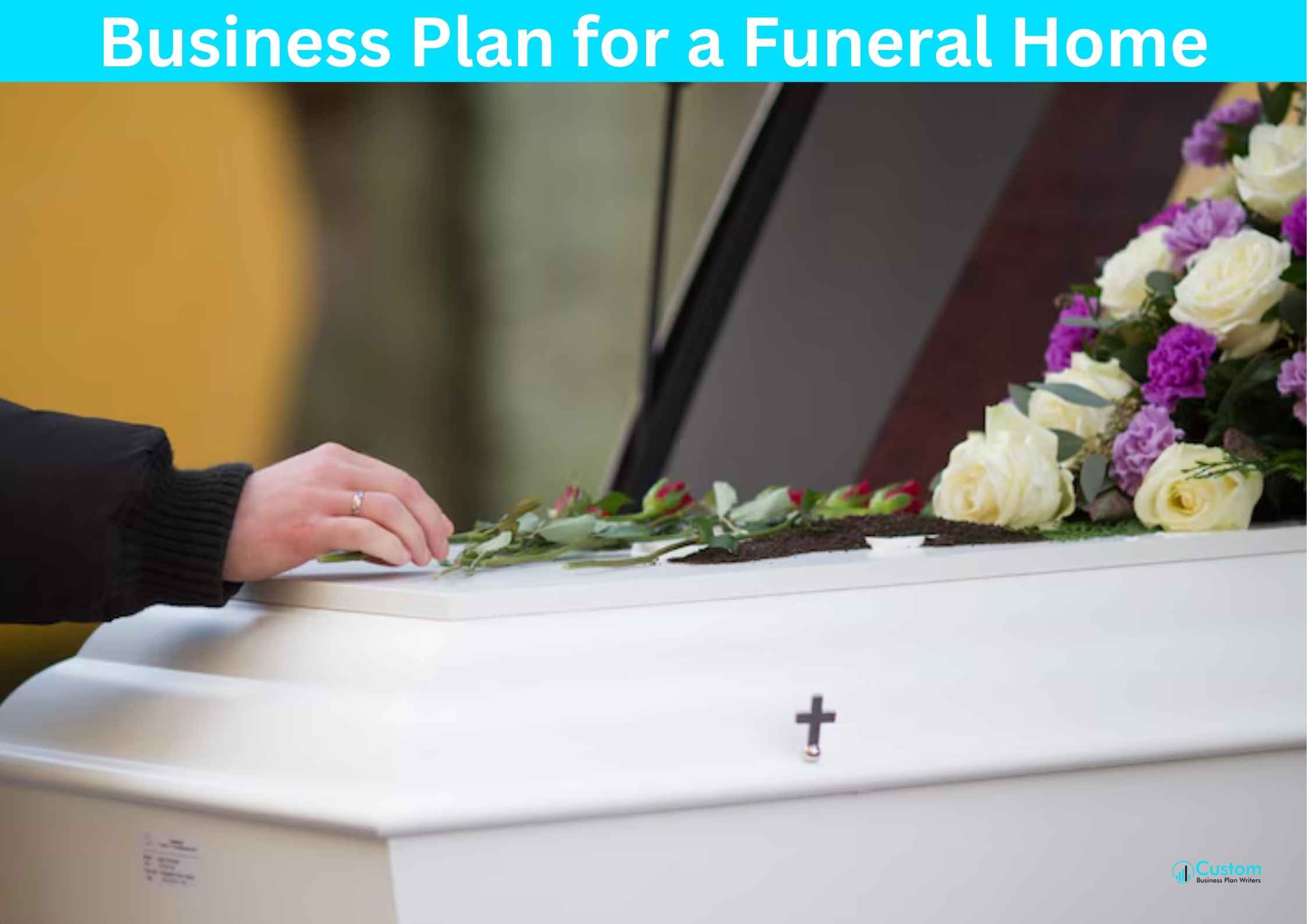How to Write a Business Plan for a Funeral Home + Template
November 28, 2024 · 7 min read

A funeral home is an important business that helps families during difficult times, but starting one requires proper planning. A business plan is a guide that explains how your funeral home will operate and attain specific goals. It helps you organize your ideas, set goals, and show others, like banks or investors, why your business is a good idea
Writing a business plan or your funeral home might feel hard, but breaking it into simple steps can make it easier. This guide will help you understand what to include, like your services, target customers, and finances.
You will also learn how to create a clear and professional plan with a template. Whether you are starting a new funeral home or improving an existing one, a good business plan is the first step to success.
What is a Funeral Home Business Plan?
A funeral home business plan is a written guide that explains how a funeral home will carry out operations to realize certain goals. It includes details about the services you will offer, like funerals, cremations, or memorials, and who your customers will be.
This business plan also shows how you will manage your business, including the costs, staff, and location. A business plan helps you stay organized and focused on your goals.
A detailed business plan is also important for showing banks or investors why your business is a good idea and worth their support. By planning everything clearly, you can make better decisions and grow your funeral home successfully.
Why is a Funeral Home Business Plan Important?
A business plan for a funeral home is important because it helps you organize your ideas and set clear goals for your business. It acts as a roadmap, guiding you through every step of starting and running a successful funeral home.
With a business plan, you can better understand your customers, competitors, and the services you need to offer. It also helps you manage finances by estimating costs and predicting profits.
If you need loans or investors, a business plan shows them that you are serious and prepared. Most importantly, it helps you stay focused and handle challenges as your business grows. A strategic business plan sets the foundation for long-term success.
Template of the Steps of Writing a Funeral Home Business Plan
Creating a funeral home business plan is easier when you have a clear template to follow. A template outlines the main sections you need, helping you organize your ideas and cover all important details.
It guides you step by step, making sure you include everything from your goals to your financial projections. This structure is helpful for staying on track and making the planning process simple.
Whether you are starting a new funeral home or improving an existing one, using a template saves time and ensures nothing is missed. It also helps make your plan professional and easy to understand for potential investors or lenders.
With this template, you can confidently prepare a business plan that sets your funeral home up for success. The following are the components of a business plan for a funeral home.
Executive Summary
The executive summary is the opening section of your funeral home business plan and provides a concise overview of your entire plan. It should include a mission statement that explains the purpose of your funeral home and the services it will provide.
Add a vision statement that outlines your long-term goals, such as becoming a trusted provider in your community. Highlight the keys to success, like offering compassionate service, high-quality facilities, or personalized packages.
A brief financial summary is also important to showcase your startup costs, projected revenue, and how you plan to achieve profitability. This section should be clear and engaging, as it sets the tone for the rest of your business plan.
While it is short, it needs to capture the most important details of your plan. Writing the executive summary last is often a good idea, as it will be easier to summarize after completing the rest of your plan.
Company Overview
The company overview section describes the details of your funeral home, including its purpose, location, and services. Start with a startup summary that outlines what your funeral home will look like when it opens, including the facility size, style, and location.
Provide details on the Startup Costs, like building expenses, equipment purchases, licensing, and staff hiring. Explain the business’s legal structure, such as whether it is a sole proprietorship, partnership, or LLC. Discuss the core values of your funeral home, like compassion, professionalism, and community involvement.
Mention any unique features or services that will differentiate your business from others in the market. This company overview section gives readers a clear picture of what your funeral home will be and sets the foundation for the rest of the plan.
Products and Services
Products and services section, lists what your funeral home will offer to clients. In the section, describe the main offerings, such as burial arrangements, cremation services, or memorial planning.
Highlight additional services, like grief counseling, floral arrangements, or customized keepsakes, that make your business unique.
Explain how each service meets the needs of your target customers and solves their problems during a difficult time. You can also mention special packages, like pre-planned funerals or eco-friendly burial options.
If you sell physical products, like urns or caskets, provide details about their quality and variety. By clearly listing your services, you help readers understand the full value your business will provide to customers.
Market and Industry Analysis
Market and industry analysis shows that you understand the funeral home industry and the specific market you want to serve. Start by discussing market trends, such as the growing interest in personalized memorials or environmentally friendly options.
Identify your target market, like families in your community, specific age groups, or religious organizations. Use research to describe their needs, preferences, and spending habits.
Break your audience into market segments based on factors like income, culture, or location, and explain how you will serve each segment.
Include data about the size of your market and its growth potential to show there is demand for your services. This analysis demonstrates your knowledge of the industry and helps build confidence in your plan.
Marketing and Sales Strategies
The marketing and sales strategies section explains how you will attract customers and grow your funeral home’s reputation. Start by discussing the marketing methods you’ll use, like social media, local partnerships, or newspaper ads.
Highlight any special promotions, such as discounts for pre-planned funerals or referral rewards for customers. Explain how you will use customer testimonials or community involvement to build trust and credibility.
Talk about your branding strategy, including your business logo, website, and overall image. Include plans for sales strategies, like offering flexible payment options or bundling services into convenient packages.
This section should outline a clear, actionable plan for reaching your audience and increasing revenue.
Management Strategy
The management strategy describes how your funeral home will be run on a daily basis. Start by introducing the owners and key managers, including their experience and qualifications.
Explain how roles and responsibilities will be divided among your team. If you plan to hire additional staff, like funeral directors, counselors, or administrative assistants, outline their roles and hiring plans. Include information about training programs or certifications your staff will need to provide excellent service.
If applicable, describe your organizational structure, such as who reports to whom. This section reassures readers that your funeral home has a capable team to handle operations effectively.
Financial Plan and Forecasts
The financial plan is one of the most important parts of your funeral home business plan. Start by listing your startup costs, including expenses like building rent, equipment, licenses, and initial marketing.
Provide a financial forecast of your expected revenue and operating expenses for the first three to five years. Use simple charts or graphs to make your financial projections easy to understand.
Include details about pricing for your services and how many customers you expect to serve. Highlight when you expect to break even and start making a profit. This section shows that you have a clear financial strategy and can manage the business’s money effectively.
Hire Funeral Home Business Plan Consultants
Hiring a funeral home business plan consultant is a good idea if you want a professional and complete plan for your business. Consultants have experience writing business plans for funeral homes, making sure all the important parts are included.
They can help you with research about your market, estimating costs and earnings, and writing a plan that is easy to understand for banks or investors. If you are not sure how to organize your plan or need expert advice, a consultant can guide you step by step.
Business plan consultants also save you time by handling difficult sections, like analyzing the industry and making financial predictions. With their help, you can create a business plan that is clear, detailed, and focused on helping your funeral home grow.
Hiring a consultant makes sure your business starts off strong and has a solid plan for success. custombusinessplanwriters are the most reliable business plan consultants.


